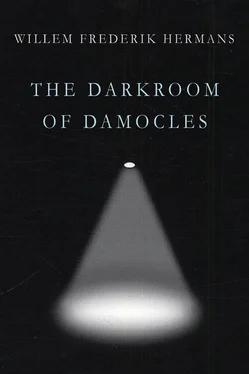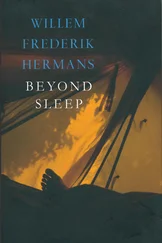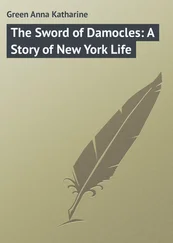‘He sleeps, and in his dream appear all the friends and relations he murdered so that he could take the throne. Do you know what they say? Well, what do you think? Do you think they say: Richard, it was awful of you to kill us off, but what’s done is done, there’s no way we can come back to life, we forgive you for what you did to us and hope that you’ll be spared our miserable fate, because even if you are punished for your crimes, it won’t do us any good … Do you think that’s what they say, Osewoudt? No, my friend, that’s not what they say. Despair and die! is what they say. Despair and die! Women, children, old folk. Despair and die they all say! Shakespeare knew what he was talking about!
‘Take Dostoevsky. In Dostoevsky you’ll find people who are gentle, kind, high-minded, generous, saintly — but they’re all insane, every one of them. That’s what it boils down to! Man is only good out of calculation, insanity, or cowardice.
‘And this brings me to the point I’m trying to make: this insight is gradually gaining acceptance. The old prophets and philosophers who claimed otherwise are losing ground. The truth can’t be kept at bay by autosuggestion. Man will have to learn to live in a world without liberty, goodness and truth. It’ll soon be taught at primary school! This war is just a foretaste of what’s in store! The world is getting far too densely populated for there to be room for madmen, do-gooders or saints. Just as we no longer believe in witches, just as sexual taboos are disappearing, so our great-grandchildren will have no qualms about allowing things to happen that would horrify your taxpaying, vote-casting populace of today.
‘The carnage of this war, the millions of defenceless people who have been gassed, beaten to death, starved, doused with burning phosphor from aeroplanes, that’s just a start. Our grandchildren won’t understand the hue and cry in the papers over such things. The persecution of Jews? You mark my words! In twenty years’ time the British, the Americans and the Russians will have the Jews exterminated by the Arabs, if it happens to suit them. May I wish you the very best of luck with your case, Osewoudt?’
The prisoners were marshalled into line. The young SS man jumped up to join them. But after two paces he paused, looked back at Osewoudt and said: ‘Or they’ll have the Arabs exterminated by the Jews, if that makes you feel any better!’
Not until the car pulled up at the entrance of the British army base in Oldenburg did Osewoudt get a chance to exchange a few words with the dentist, whom they had collected on the way.
‘I gather you were a close acquaintance of the Jagtman family,’ said Osewoudt.
‘Yes, they were all patients of mine.’
‘And did any of them look like me?’
‘I should say so. That was why I phoned the police when I saw that picture of Dorbeck in the paper. But you must realise that it’s five years since I last saw him. I don’t keep a photo album of my patients.’
‘What exactly was his name?’
‘Egbert.’
‘Egbert. Did you see him at all after May 1940?’
‘That’s a bit of a problem. The last time he came to see me was in August 1939. He was called up after that.’
‘Was he in the artillery?’
‘I wouldn’t know for sure.’
‘How old was he?’
‘Twenty-three.’
‘What if he’d had a lot of work done on his teeth by another dentist, while he was in the army?’
‘Oh, the distinctive features of a person’s dentition aren’t affected, under normal circumstances. The chance of that happening is incredibly small.’
The dentist opened a small case he had been holding on his lap throughout the journey. Just then Selderhorst got in the car again, after having a word with the British commander. He started the engine. The British sentry waved them on. They drove very slowly down a track that was completely ploughed up by tanks, towards a low shed.
There were more British soldiers standing about, unarmed, with their flat helmets pushed back at a jaunty angle. They directed the car to a parking space among their own vehicles.
Selderhorst, the dentist, Spuybroek, and Osewoudt got out.
The dentist put down his case on the grass and opened it. He took out a large, buff-coloured card. It was a diagram of a full set of human teeth, several of them annotated, in two facing horseshoe shapes. On the left were listed the patient’s particulars: surname, first name, date of birth, dental appointments, and so on. The dentist happened to be holding the card in his left hand, thus obscuring most of the list, but Osewoudt was able to catch a glimpse of the words Jagtman and Egbert, and a date: 3 December, 1916. There were three addresses, two of which were scored out.
The dentist pointed to the chart.
‘A diagram like this,’ he said, ‘gives a complete record of everything that has been done to a person’s teeth. It represents a unique combination. Rather like the combination which opens a safe. For example, here we have an inlay in the third molar in the bottom left, a filling on the inside of the second molar, an extracted eye tooth (necessitated in this case by a childhood accident — he was hit by a flying stone), three fillings in the third molar on the right, et cetera … No, no, the chances of this combination occurring in anyone else are negligible.’
A British lieutenant came up to them with a soldier in tow, who set down four pairs of rubber boots on the grass. The lieutenant was already wearing rubber boots, as was the soldier.
‘Well now, gentleman,’ said the lieutenant, ‘would you be so kind as to follow me? That’s very kind, because I can’t say this is going to be a pleasant undertaking. The storage of the exhumed bodies leaves much to be desired, not least due to their poor state of preservation. The mass grave was discovered purely by chance ten days ago. It’s not far from our base, which has simplified transportation.’
He produced a key, put it in a padlock on the shed door, and said: ‘As far as we can tell, the majority are Belgian and Dutch servicemen.’
‘Were they in uniform, then?’ Osewoudt asked.
‘Some were. The others had nothing on — another kind of uniform, so to speak.’
In a nearby field stood a diesel generator, blowing blue vapour into the misty air. There were cables running from the generator to various sheds, including this one.
The dentist put away Jagtman’s dental chart and put on a pair of rubber gloves. From his case he took a long stainless steel spatula, almost as long as a crowbar, and a curious kind of clamp. The clamp consisted of two flat hooks, as big as spoons and with the convex sides turned outwards. The two hooks could be made to move apart by adjusting a screw. After casting an eye over each of these instruments, he put them all back in the case, which also contained a small mirror on a long handle and a pocket torch.
The door swung open and a sickly stench of decaying flesh mixed with formaldehyde wafted out. The officer turned a switch. Two inspection lamps suspended from the eaves flipped on. The dentist picked up his case.
There were so many bodies in the shed that there was hardly room to walk. Many of them were piled up on each other, so that only the faces of the top ones were visible.
‘Don’t worry,’ said the lieutenant, ‘we’ve marked the one we think fits the description.’
Looking left and right, he led the way for the others. Their rubber boots squelched in the black slime underfoot.
All the way at the back lay the marked body. There was a cross of red lead paint on the pale blue, distended belly. The eyelids were parted, but the sockets were empty. There was thin black stubble on the cheeks. The hair on the head was black, too.
Читать дальше












